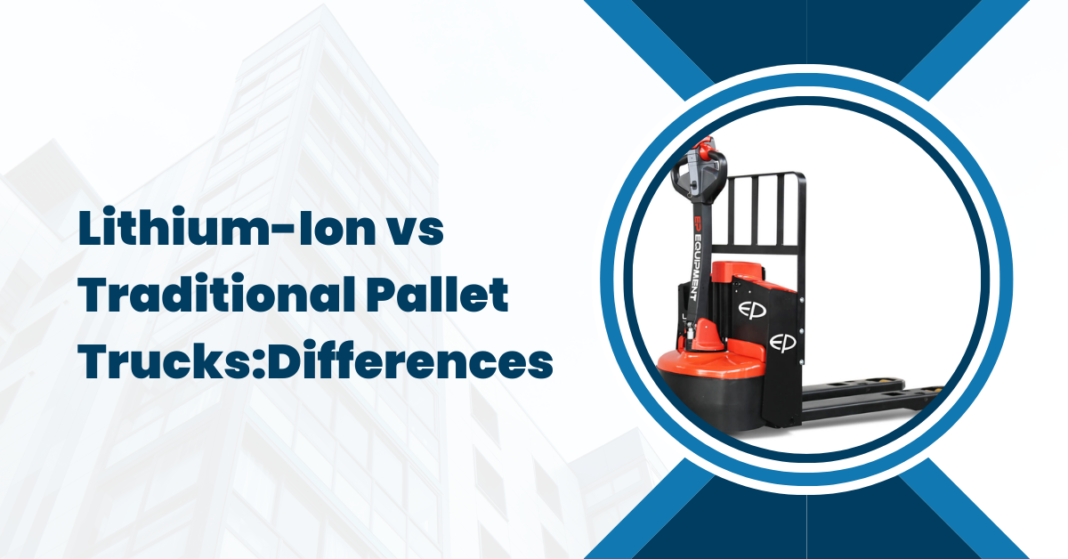In warehouses, factories, and distribution centers, pallet trucks play a significant role in moving materials from one place to another. These trucks help speed up processes, increase efficiency, and reduce the strain on workers. But with the advancement of technology, pallet trucks have seen some important changes. Today, many businesses face a choice between lithium-ion pallet trucks and traditional pallet trucks. While both types of trucks serve the same basic function, there are some clear differences between them.
In this blog, we will explore the key differences between lithium-ion and traditional pallet trucks, breaking down important factors like charging time, battery life, maintenance, and cost. This will help you understand which one may be the best choice for your business and make an informed decision that suits your needs.
What Are Traditional Pallet Trucks?
Traditional pallet trucks, also known as lead-acid pallet trucks, have been around for a long time. They are powered by lead-acid batteries, which have been the industry standard for decades. These trucks are reliable, tough, and have been used in various industries to move heavy loads from one place to another. They can be either manual or electric, with the electric version being more common in large warehouses.
Lead-acid batteries are large, heavy, and need to be charged after several hours of use. The process of charging a lead-acid battery can take anywhere between 8 to 12 hours. After charging, these batteries require a cooling period, which can take another 6 to 8 hours. This long downtime can affect productivity, especially in environments that need to keep operations running 24/7.
Another key point about traditional pallet trucks is maintenance. Lead-acid batteries require regular maintenance, such as topping up with distilled water, cleaning terminals, and checking for damage. Without proper maintenance, these batteries may not last as long and could fail unexpectedly, leading to costly downtime.
Note – Discover how Lithium-Ion pallet trucks can transform material handling and boost efficiency. With faster charging times and lower maintenance needs, these trucks are the ideal solution for any business. Explore the benefits with Blackwood Hodge Power Services Ltd and upgrade your operations today.
What Are Lithium-Ion Pallet Trucks?
Lithium-ion pallet trucks are a newer and more advanced version of traditional pallet trucks. As the name suggests, these trucks are powered by lithium-ion batteries, which are known for their fast charging, long life, and efficiency. Lithium-ion batteries have become popular in recent years due to their use in mobile phones, laptops, and electric cars. Now, they are making their way into material handling equipment like pallet trucks.
One of the biggest advantages of lithium-ion pallet trucks is their charging time. Unlike traditional lead-acid batteries that take hours to charge, lithium-ion batteries can be fully charged in just 1 to 2 hours. This means that operations can continue with minimal disruption. Moreover, lithium-ion batteries do not require a cooling period after charging, allowing businesses to resume operations quickly.
Lithium-ion batteries also last longer than lead-acid batteries. They can handle more charge cycles, meaning they can be charged and discharged more times before needing a replacement. This longer lifespan makes them a cost-effective solution in the long run. Additionally, lithium-ion batteries do not require the regular maintenance that lead-acid batteries do, which can save time and reduce maintenance costs.
Key Differences Between Lithium-Ion and Traditional Pallet Trucks
While both types of pallet trucks are useful for moving goods, the differences between lithium-ion and traditional pallet trucks can be quite significant. These differences can impact your business’s productivity, costs, and overall efficiency. Let’s look at the most important factors in detail.

Battery Charging Time
One of the most noticeable differences between lithium-ion and traditional pallet trucks is the charging time. As mentioned earlier, lead-acid batteries take a long time to charge, usually 8 to 12 hours, followed by a cooling period. This can cause delays in operations, especially if the business does not have extra batteries on hand. On the other hand, lithium-ion batteries can be charged in just 1 to 2 hours. This fast charging time allows for quick turnaround and less downtime, making them ideal for businesses with high demand.
Battery Life and Lifespan
Another major difference is the battery life and lifespan. Lead-acid batteries have a shorter life cycle compared to lithium-ion batteries. A lead-acid battery typically lasts for 500 to 1000 charge cycles, while a lithium-ion battery can last for up to 3000 charge cycles. This means that lithium-ion batteries can last up to three times longer than lead-acid batteries, making them more cost-effective in the long run. This longer lifespan also means less frequent battery replacements, reducing the need for downtime and saving money on new batteries.
Maintenance Requirements
When it comes to maintenance, lead-acid batteries require regular attention. They need to be watered frequently to prevent damage, and the terminals must be kept clean to ensure proper functioning. Without proper maintenance, lead-acid batteries can degrade faster, leading to shorter battery life and potential damage to the truck itself. On the other hand, lithium-ion batteries require little to no maintenance. There’s no need to water them, clean terminals, or perform any special upkeep. This makes lithium-ion pallet trucks easier to manage and operate, especially for businesses that do not have dedicated maintenance teams.
Environmental Impact
The environmental impact is another key area where lithium-ion pallet trucks stand out. Lead-acid batteries contain hazardous materials, such as lead and sulfuric acid, which can harm the environment if not disposed of properly. Moreover, the manufacturing process for lead-acid batteries can produce a significant amount of pollution. While lithium-ion batteries are not completely free of environmental concerns, they are generally considered to be a greener option. They do not contain the same level of harmful chemicals, and they are more energy-efficient, meaning they consume less power during use and charging.
Additionally, because lithium-ion batteries have a longer lifespan, fewer batteries need to be produced, reducing the overall environmental footprint. Companies looking to reduce their carbon footprint may find that switching to lithium-ion pallet trucks is a positive step in that direction.
Cost and Return on Investment
At first glance, lithium-ion pallet trucks can seem more expensive than traditional pallet trucks. However, when considering the long-term benefits, the cost difference becomes more understandable. Lithium-ion pallet trucks may have a higher upfront cost due to the advanced battery technology, but they offer significant savings over time.
For example, the longer battery life of lithium-ion batteries means fewer replacements, which can save money in the long run. Additionally, their fast charging time can lead to less downtime, which increases productivity and ultimately boosts profitability. The lack of maintenance requirements also means businesses save on labor and parts needed for traditional battery upkeep.
When you factor in these benefits, the return on investment for lithium-ion pallet trucks can be much higher than that of traditional trucks. Many businesses find that the initial investment in lithium-ion technology pays off within a few years due to the savings in maintenance, battery replacements, and increased productivity.
Which One Should You Choose?
Choosing between lithium-ion and traditional pallet trucks depends on your specific business needs. If you run a smaller operation with low demand, traditional pallet trucks may be sufficient. However, if your business requires high efficiency, quick turnaround, and low maintenance, lithium-ion pallet trucks could be the better choice.
Consider factors like how often your trucks will be used, how important downtime is to your operation, and how much maintenance your team can handle. For businesses looking to optimize operations and reduce long-term costs, lithium-ion pallet trucks are an excellent investment. On the other hand, businesses with a smaller budget or lower usage may find traditional pallet trucks to be more affordable upfront.
Conclusion
In the debate between lithium-ion and traditional pallet trucks, it’s clear that both have their pros and cons. While traditional pallet trucks have served industries well for many years, lithium-ion trucks offer several key advantages, including faster charging times, longer battery life, reduced maintenance, and environmental benefits. Businesses that prioritize efficiency and long-term savings will likely find that lithium-ion pallet trucks offer the best value.
For more insightful articles related to this topic, feel free to visit coknews.com




